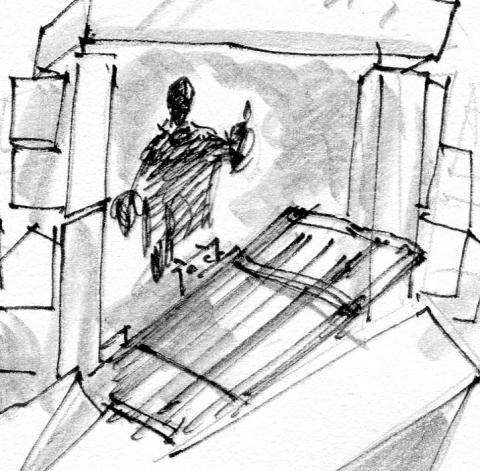
“For God did not send his Son into the world to condemn the world, but that the world might be saved through him" (John 3:17).
Today's reading from Acts describes the first time the power of the resurrection is directly experienced by the Apostles. It is an act of liberation. Thrown into jail for preaching about Jesus, the Apostles are mysteriously set free from their locked and guarded cell during the night.
Luke's account in Acts parallels the scene at the tomb, where, despite the stone sealing the entrance and the presences of guards, the risen Jesus escapes death and entombment. His mission, proclaimed in Luke 4 at his inaugural address in the synagogue in Nazareth, is to "set captives free." He will lead the way to freedom from death, the most basic captivity of all, and also extend the power of liberation to his followers: freedom from fear, freedom from oppression and freedom from all worldly attempts to define and limit the transformation they are announcing by the way they live.
The whole idea of liberation has long been a contentious issue within the church. Opponents of so-called "liberation theology" say it reduces the spiritual and universal meaning of resurrection to a kind of freedom movement in this world. The church, they say, should not take sides in political or economic matters, and Jesus should not be seen as only a social revolutionary.
Proponents of liberation theology say that the Gospel is meaningless if it does not change the actual lives of people in this world, especially those who are poor and oppressed because of structural injustice and violent repression. If the crucified and risen Christ has identified himself with the poor, should not his church work toward their liberation from human suffering?
Pope Francis has always promoted the social justice teaching of the church as integral to the Gospel. We must advocate and work for the physical and social liberation of the world's poor majority, and he has openly challenged political and economic systems that exploit the poor.
Assertions that religion is only about the "next" world or just the spiritual welfare of souls run counter to Jesus's words in today's Gospel that he was sent not to condemn this world but to save it. While his life, death and resurrection do promise liberation beyond history, the freedom to live fully in this life and world is part of that liberation for all peoples now. Risen life begins here.
St. Paul, the first theologian of the mystery of risen life, experienced himself that “the Gospel cannot be chained” (2 Tim 2:9), and there is no jail cell or prison on earth that can stop the power of liberation Jesus offers from reaching the oppressed peoples of the world. His revolution of love, nonviolent transformation and justice are inseparable from true evangelization.








